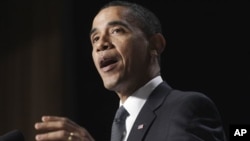President Barack Obama is scheduled to appear at the annual National Prayer Breakfast on Thursday. It is but one of the regular displays of faith in which U.S. presidents have a prominent role. But while many Americans want their president to pray, some critics say the prayer breakfast is about hypocrisy.
"I believe in the power of prayer because I felt it in my own life," former President George W. Bush told the prayer breakfast in 2008. "Prayer has strengthened me in times of personal challenge."
Two years later, President Barack Obama told thousands of guests that prayer can accomplish much.
"It can touch our hearts with humility. It can fill us with a spirit of brotherhood. It can remind us that each of us are children of an awesome and loving God," he said.
The National Prayer Breakfast was started in the 1950s. It's often held in the ballroom of a fancy hotel, and has drawn well-known guests such as Mother Teresa, former British prime minister Tony Blair and the musician Bono.
But it continues to come under criticism from some secular and religious groups in the United States.
Some object to the sponsoring Christian foundation known as The Fellowship, which keeps its membership list secret and is said to be influential in Congress. Others say the Breakfast is an exercise in hypocrisy.
The Reverend Grayland Hagler attended the White House breakfast in 1993 and says he was unmoved.
"For me, it was a theologically cold event," he says. "And when I say theologically cold event, it was the perfunctory engagement of prayer and not the substantial engagement of prayer that I would hope to see."
Hagler is a minister at the Plymouth Congregational Universal Church of Christ in Washington. He belongs to a group of interfaith clergy associated with the "Occupy" movement, which is protesting the growth of income inequality in America. The "Occupy Faith" clergy are organizing an alternative "People's Prayer Breakfast" to be held at the same time as the National Prayer Breakfast.
"A prayer breakfast that probably doesn't have the ability to critique what's going on in our country misses a whole wide swath of what prayer is also about," says the Rev. Karen Brau of the Luther Place Memorial Church. She adds that a crucial element of faith is challenging the powers that be.
"What happens often when religion goes into the public square is that it doesn't necessarily come with its full depth."
But Americans want to know that their president is a person who prays, says Mark Rozell, a public policy lecturer at George Mason University and editor of the book, "Religion and the American Presidency."
"The National Prayer Breakfast is a reflection of the overall culture in the United States, where the religious commitment and participation is going up rather than going down, and people expect to have a president of strong religious faith, and they are comfortable with president engaging in public displays of religious faith and commitment," he says.
With America's religious landscape becoming increasingly diverse, Rozell says the National Prayer Breakfast is a way for the president to express his faith publicly - without favoring one religion over another.




